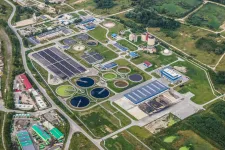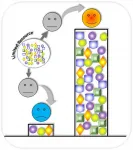Half of global wastewater treated, rates in developing countries still lagging
2021-02-08
(Press-News.org) A new study by scientists at Utrecht University and the United Nations University concludes that about half of global wastewater is treated, rather than the previous estimate of 20%. Despite this promising finding, the authors warn that treatment rates in developing countries are still very low. The study and its dataset were published Open Access in the journal Earth System Science Data.
Humans and factories produce vast quantities of wastewater per day. If not properly collected and treated, wastewater may severely threaten human health and pollute the environment.
144 million swimming pools
The authors use national statistics to estimate volumes of wastewater production, collection, treatment and reuse. "Globally, about 359 billion cubic metres of wastewater is produced each year, equivalent to 144 million Olympic-sized swimming pools," says Edward Jones, PhD researcher at Utrecht University and lead author of the study. "About 48 percent of that water is currently released untreated. This is much lower than the frequently cited figure of 80 percent."
While the results show a more optimistic outlook compared to previous work, the authors stress that many challenges still exist. "We see that particularly in the developing world, where most of the future population growth will likely occur, treatment rates are lagging behind," Jones explains. "In these countries in particular, wastewater production is likely to rise at a faster pace than the current development of collection infrastructure and treatment facilities. This poses serious threats to both human health and the environment. There is still a long way to go!"
Creative reuse
The main problem, especially in the developing world, is the lack of financial resources to build infrastructure to collect and treat wastewater. This is particularly the case for advanced treatment technologies, which can be prohibitively expensive. However, the authors highlight potential opportunities for creative reuse of wastewater streams that could help to finance improved wastewater treatment practices.
"The most obvious reuse of treated wastewater is to augment freshwater water supplies," Jones states. Treated wastewater reuse is already an important source of irrigation water in many dry countries, particularly in the Middle East and North Africa. However, only 11% of the wastewater produced globally is currently being reused, which shows large opportunities for expansion.
From 'waste' to resource
"But freshwater augmentation is not the only opportunity," says Jones. "Wastewater also has large potential as a source of nutrients and energy. Recognition of wastewater as a resource, opposed to as 'waste', will be key to driving improved treatment going forward."
However, the authors stress the importance of proper monitoring of wastewater treatment plants, accompanied by strong legislation and regulations, to ensure that the reuse of wastewater is safe. The authors also acknowledge public acceptance as another key barrier towards increasing wastewater reuse.
INFORMATION:
The data and associated journal article are freely available through PANGAEA and Earth System Science Data), respectively.
[Attachments] See images for this press release:

ELSE PRESS RELEASES FROM THIS DATE:
2021-02-08
Faster speech rate, greater intensity in the middle of the word, and falling pitch at the end of the word: that is the prosody[1] to adopt if one wants to come across as reliable and honest to one's listeners. Scientists from the Science and Technology for Music and Sound laboratory (CNRS/Ircam/Sorbonne Université/Ministère de la Culture)[2] and the Perceptual Systems Laboratory (CNRS/ENS PSL) have conducted a series of experiments[3] to understand how we decide, based on the voice, whether a speaker is honest and confident, or on the contrary dishonest and uncertain. They have also shown that this signature was perceived similarly ...
2021-02-08
The sense of hearing is, quite literally, a molecular tightrope act. Turns out, it involves acrobatics as well.
In a paper published in Nature Communications on Feb 8, researchers at Harvard Medical School and Boston Children's Hospital show that a dynamic and delicate connection between two pairs of diminutive protein filaments plays a central role in in hearing.
The tension held by these filaments, together called a tip link, is essential for the activation of sensory cells in the inner ear. The team's analyses reveal that the filaments, which are joined end-to-end, work together like trapeze artists holding ...
2021-02-08
COVID-19 has not only caused a temporary drop in global CO2 emissions, it has also reduced the share of power generated by burning coal - a trend that could in fact outlast the pandemic. This is the key result of a new study by a team of economists based in Potsdam and Berlin that looked at COVID-19's impact on the energy system and demand for electricity. Their findings show that the pandemic, while putting a terrible toll on people's lives and the economy, has also opened a window of opportunity to make this current trend of decreasing coal use irreversible: Supported by the right climate policy measures, power sector emissions could decline more rapidly than previously thought.
"Coal has been hit harder by the Corona crisis than other power sources - and the reason is ...
2021-02-08
Higher blood pressure at night than in daytime may be a risk factor for Alzheimer's disease in older men. This is suggested by a new study from researchers at Uppsala University, now published in the journal Hypertension.
'Dementia' is an umbrella term used to describe a category of symptoms marked by behavioural changes and gradually declining cognitive and social abilities. Numerous factors, including hypertension (high blood pressure), affect the risk of developing these symptoms.
Under healthy conditions, blood pressure (BP) varies over 24 hours, with lowest values reached at night. Doctors call this nocturnal blood pressure fall 'dipping'. However, in some people, ...
2021-02-08
A new process for inserting synthetic gene circuits into host cells, developed by a team of bioengineers at Arizona State University, has broad implications for improving the effectiveness of a range of disease therapies.
Synthetic biology is an interdisciplinary research field that uses engineering principles to create biological components that don't exist in the natural world. These synthetic components mimic naturally evolved organisms, but are customized to fight disease, including cancer.
A paper recently published in Nature Communications, "Winner-Takes-All Resource Competition Redirects Cascading Cell Fate Transitions," outlines how gene circuits can be reconfigured so that they do not overwhelm the host cells.
"We ...
2021-02-08
In the early months of the COVID-19 pandemic, there was an almost 80% decrease in primary care office visits in Ontario and a 56-fold increase in virtual visits, found new research in CMAJ (Canadian Medical Association Journal).
"Initial reports from primary care providers during the pandemic in both Canada and the United States showed major disruptions to care, decreased payments, challenges keeping offices functioning, lack of personal protective equipment and widespread uptake of virtual care, but we didn't know how COVID-19 had affected in-person office visits," says ...
2021-02-08
People living in regions with high levels of outdoor artificial light at night may face a higher risk of developing thyroid cancer. The finding comes from a study published early online in END ...
2021-02-08
A new national survey of more than 2,000 Americans by END ...
2021-02-08
A method that instructs immune system cells to help repair damaged tissues in the intestine has been developed by researchers at KU Leuven and Seoul National University. This opens the way for more effective treatment of inflammatory bowel disease, including ulcerative colitis and Crohn's disease. The study was carried out on humans and mice.
When functioning correctly, the immune system protects against harmful agents such as bacteria that get into the body. But in conditions such as inflammatory bowel disease (IBD), the immune system attacks the tissues that line the gut, forming ulcers and causing pain and discomfort. Nearly 3.9 million women and 3.0 ...
2021-02-08
Philadelphia, February 8, 2021 - Early exposure to nutritious foods may help children develop more healthful eating habits, but package labels can make it difficult for parents to understand what they are feeding their young children, according to a END ...
LAST 30 PRESS RELEASES:
[Press-News.org] Half of global wastewater treated, rates in developing countries still lagging

